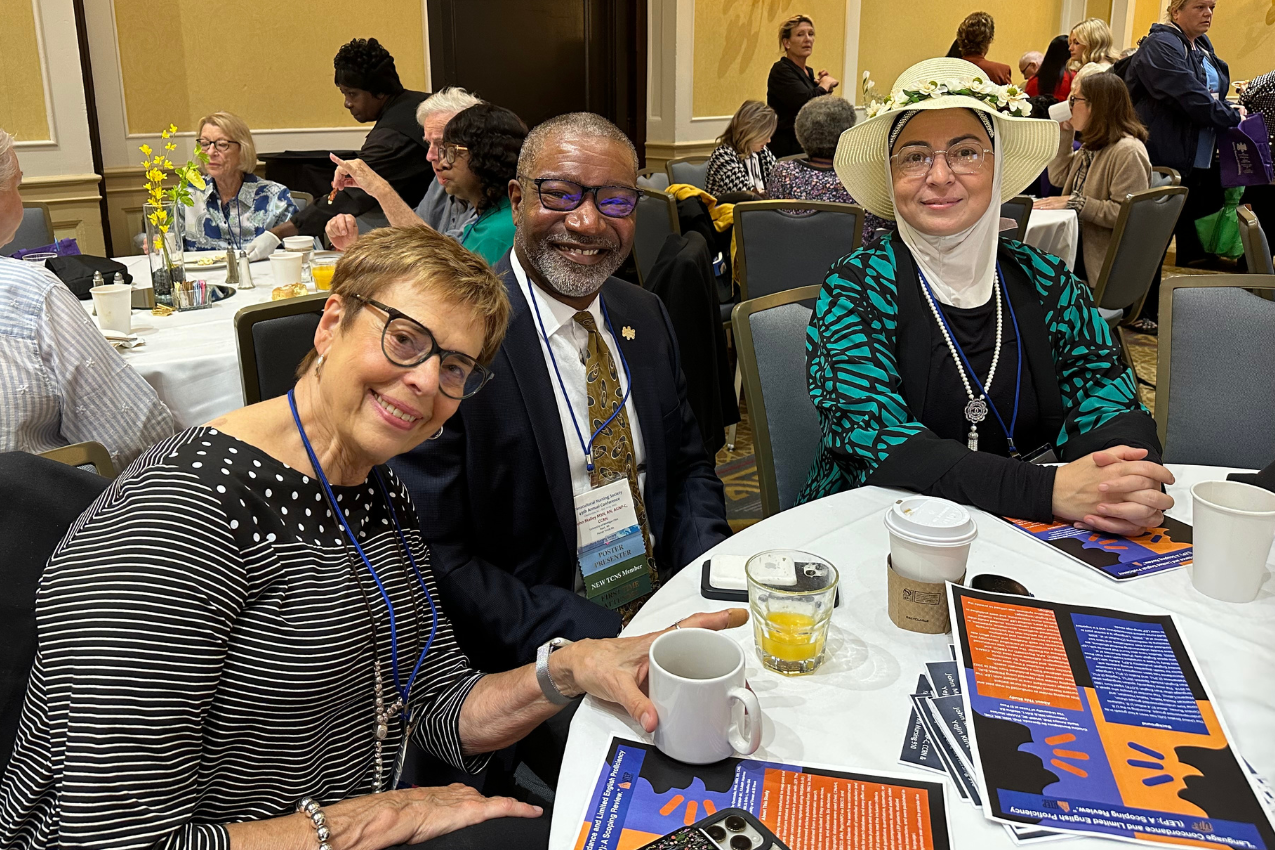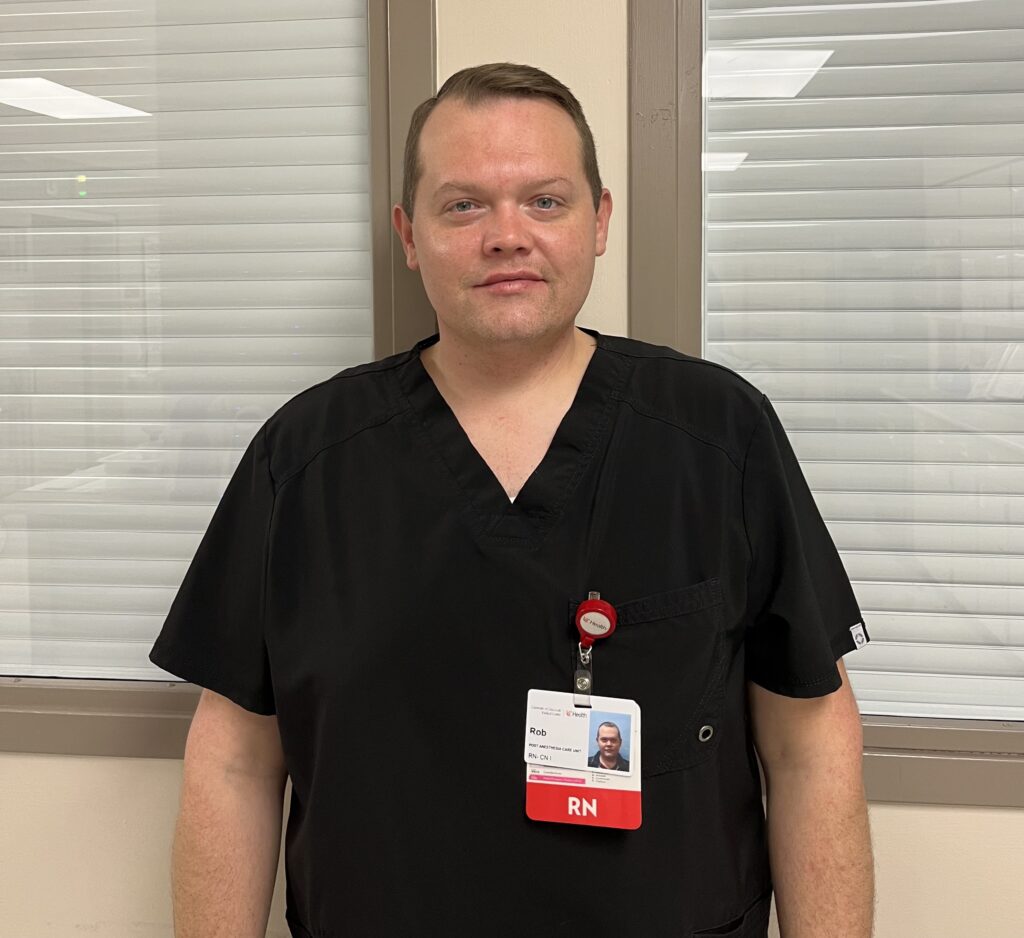UM-Flint doctoral nursing grads make clinical practice impact

This December, 108 students from the University of Michigan-Flint's School of Nursing successfully completed Doctor of Nursing Practice programs (BSN or MSN to DNP and Graduate Nursing Certificates), one of the largest doctoral cohorts graduating from the school in recent years.
As part of their studies, DNP students design, implement, evaluate and disseminate the results of quality improvement projects. These projects give students the flexibility to choose a topic in the broad health care field that is of particular interest to them. John Mailey's connection with Detroit led him to work with a local clinic in the city, while Robert Henison's experience in psychiatric care led to a focus on suicide prevention.
John Mailey
If you wonder what inspired Mailey to enter the nursing profession, one only has to look at his family: Mailey's grandmother, mother, and sister are all nurses.
"It's a family affair. Health care has always been my passion and I love science. I'm more of an extroverted person. That's why I became a nurse."
Mailey owns a community primary care clinic and continued working as a nurse practitioner while enrolled in the MSN-DNP program.
A strong connection with his hometown of Detroit led him (in partnership with classmate Yejin Kim who co-led this QI project) to examine how primary care providers and staff at a local community clinic increased the number of referrals in diabetic African American patients. He also looked at the subsequent increase in patient acceptance of referrals leading to greater utilization of diabetes self-management and support resources and improvement in diabetes management. In addition, as a result of this QI project, several health care providers in the local clinic received training in transcultural health care.
Mailey and Kim used the "Theory of Culture Care Diversity and Universality" as a theoretical framework for their QI project. Mailey commented that understanding and respecting patients' cultural backgrounds, beliefs, and practices is crucial for providing effective culturally sensitive and congruent care.
"The average age of my patients is 54 and quite a few of them have diabetes which can be mitigated by lifestyle changes," he said. "Leininger's culture care modes helped me look at people who don't want their culture invaded but need to make lifestyle changes and as a result, I was able to accommodate their needs while preserving their important cultural values and traditions."
Under the mentorship of three SON faculty – Barbara Kupferschmid, Hiba Wehbe-Alamah and Marilyn McFarland – Mailey and Kim presented their findings in a poster titled "Transcultural Implementation of the Diabetes Self-Management Education and Support Program with African American Patients" at the 49th Annual Transcultural Nursing Society Conference in Charleston, South Carolina.
"Attending and presenting in person at the TCNS conference was an unforgettable experience," said Mailey. "Dr. Wehbe-Alamah and Dr. McFarland nurtured me and made me really understand what Leininger's Culture Care Theory was truly about. At the conference, they introduced me to other world-renowned scholars in transcultural nursing and helped me network and make important connections."
Robert Henison

Like Mailey, Henison's passion for nursing was fueled by family and a childhood desire to become a Wolverine. "The Flint campus was the best choice for me for my area of study. It was just exciting to be able to go to a very highly regarded school with faculty known as experts in their fields, to complete my professional goals."
Henison's research focus was inspired by his work in psychiatric care, in particular mental health screenings for suicide prevention. With the mentorship of SON faculty Hiba Wehbe-Alamah and Suzanne Lugger, and in collaboration with classmate Sheila Woodward (who co-led this QI project), he co-designed, implemented, evaluated and disseminated the results of a QI project focused on suicide screening in primary care.
"I co-designed a protocol for primary care clinicians to be able to quickly assess patients for their risk of suicide," Henison said. "The literature shows that a lot of patients see their primary care provider for mental health disorders, yet, they have recurring issues that are not being addressed because PCPs lack confidence in their ability to assist patients with mental health conditions or because they don't really have the time to dive into emotional and behavioral disturbances."
According to Henison, it is not enough for PCPs to screen patients for depression – a suicide screening is equally important. Incorporating a suicide screening and prevention protocol will help identify and refer patients at risk for suicide to appropriate mental health services while simultaneously not placing an additional burden on the caseload of PCPs.
The intervention used in this QI project consisted of providing education to primary care providers about how to properly incorporate the "Ask Suicide-Screening Questions" toolkit into practice and how to make appropriate mental health referrals to patients who screen positive for suicidal ideation. A pre- and post-chart review of more than 200 patients determined that the suicide screening rate increased by 100% and the referral rate increased from 2.9% to 12.6%, thus demonstrating significant practice change and impact on clinical practice.
"This QI project contributed to expanding primary care providers' learning mindset and thinking about how to better serve their patients. They're not experts in mental health, but they can now be more vigilant about it."
UM-Flint's MSN to DNP is designed for current registered nurses who have earned their MSN degree while the BSN to DNP with MSN allows applicants to start the program as a registered nurse with or without a BSN degree. Once the MSN portion of the program is completed, students can become licensed and board-certified nurse practitioners and clinically practice while completing the DNP with as little as 15 additional credits.
Related Posts
No related photos.
Asinda Sirignano
Asinda is a communications specialist with the School of Nursing. She can be reached at asirigna@umich.edu.